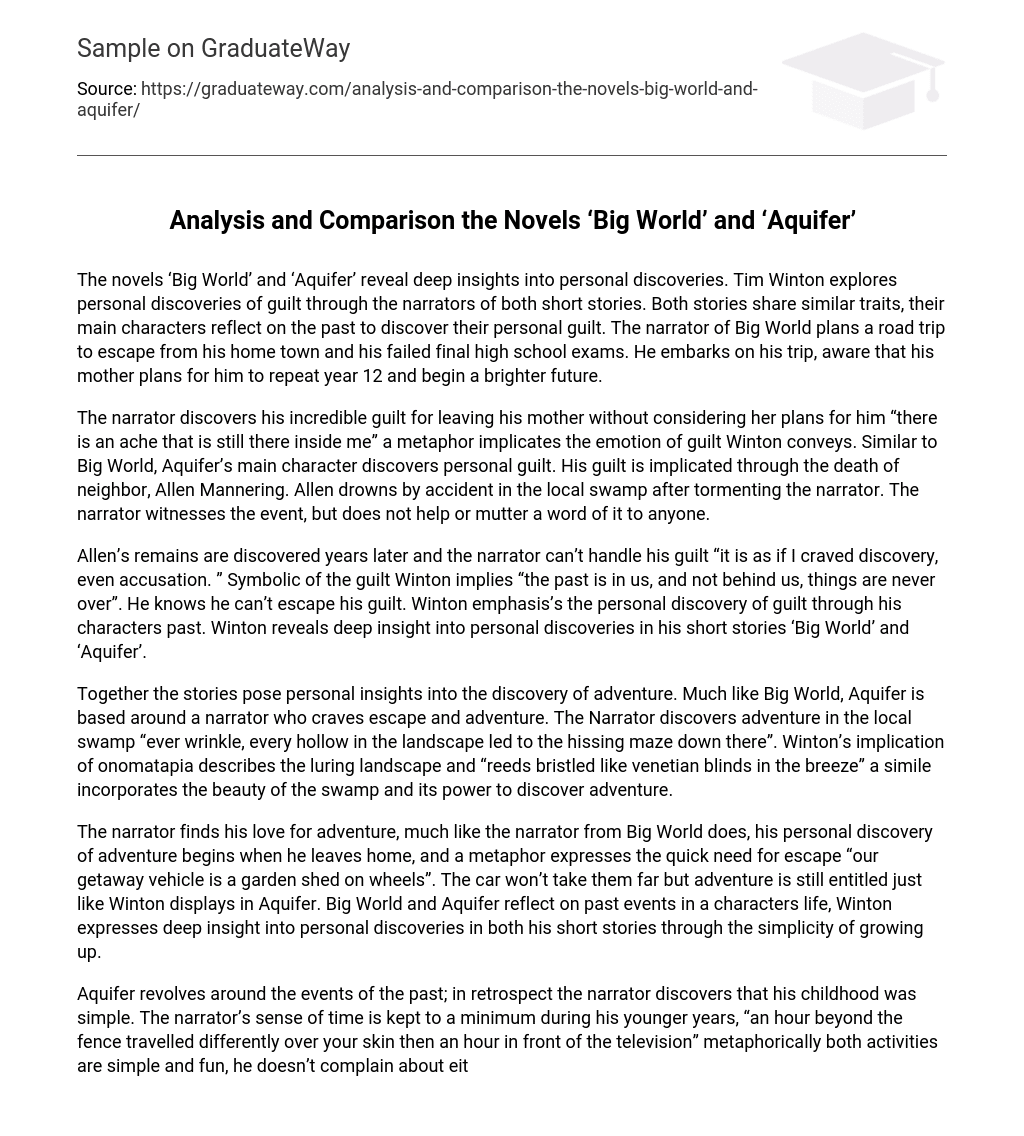The novels ‘Big World’ and ‘Aquifer’ reveal deep insights into personal discoveries. Tim Winton explores personal discoveries of guilt through the narrators of both short stories. Both stories share similar traits, their main characters reflect on the past to discover their personal guilt. The narrator of Big World plans a road trip to escape from his home town and his failed final high school exams. He embarks on his trip, aware that his mother plans for him to repeat year 12 and begin a brighter future.
The narrator discovers his incredible guilt for leaving his mother without considering her plans for him “there is an ache that is still there inside me” a metaphor implicates the emotion of guilt Winton conveys. Similar to Big World, Aquifer’s main character discovers personal guilt. His guilt is implicated through the death of neighbor, Allen Mannering. Allen drowns by accident in the local swamp after tormenting the narrator. The narrator witnesses the event, but does not help or mutter a word of it to anyone.
Allen’s remains are discovered years later and the narrator can’t handle his guilt “it is as if I craved discovery, even accusation. ” Symbolic of the guilt Winton implies “the past is in us, and not behind us, things are never over”. He knows he can’t escape his guilt. Winton emphasis’s the personal discovery of guilt through his characters past. Winton reveals deep insight into personal discoveries in his short stories ‘Big World’ and ‘Aquifer’.
Together the stories pose personal insights into the discovery of adventure. Much like Big World, Aquifer is based around a narrator who craves escape and adventure. The Narrator discovers adventure in the local swamp “ever wrinkle, every hollow in the landscape led to the hissing maze down there”. Winton’s implication of onomatapia describes the luring landscape and “reeds bristled like venetian blinds in the breeze” a simile incorporates the beauty of the swamp and its power to discover adventure.
The narrator finds his love for adventure, much like the narrator from Big World does, his personal discovery of adventure begins when he leaves home, and a metaphor expresses the quick need for escape “our getaway vehicle is a garden shed on wheels”. The car won’t take them far but adventure is still entitled just like Winton displays in Aquifer. Big World and Aquifer reflect on past events in a characters life, Winton expresses deep insight into personal discoveries in both his short stories through the simplicity of growing up.
Aquifer revolves around the events of the past; in retrospect the narrator discovers that his childhood was simple. The narrator’s sense of time is kept to a minimum during his younger years, “an hour beyond the fence travelled differently over your skin then an hour in front of the television” metaphorically both activities are simple and fun, he doesn’t complain about either, reflecting the simplicity of childhood. As the boy grows older he turns further attention to the time “a minute was longer some days then others” proving responsibility and age matures a person, the simplicity of childhood is lost.
The narrator of Big World also discovers personal changes of adult hood, rather than the simplicity of being young. The narrator’s relationship with his best friend Biggie changes as he grows up. Imagining his future, the narrator discovers “biggie is never there with me in the picture” symbolic of a complicated situation, unlike the simplicity when they began their friendship 5 years before. Big World is much like Aquifer, Winton’s stories both reflect the simplicity of being young and the main characters discover of this as they grow up.





